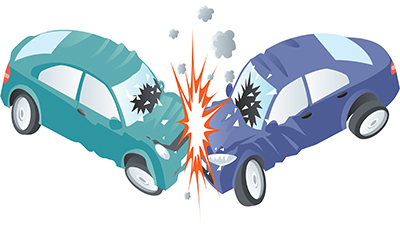|
Summer 2015
IN THIS ISSUE
d&G Lawyer News
Educational Workshops
Interested in a seminar on a recurring legal issue confronting your company?
Contact our event coordinator,
to learn more about our educational workshop options.
Visit Our Site:

101 E. Kennedy Blvd.,
Suite 2000
Tampa, FL 33602
813-229-2775
|

Has your insurance company told you that your no-fault coverage is limited to merely $2,500, even though you purchased $10,000 of coverage?
By: David M. Caldevilla
Florida is one of ten states that require all owners of motor vehicles to buy $10,000 in personal injury protection (PIP) auto insurance. PIP insurance is intended to provide injured drivers and passengers up to $10,000 in immediate medical coverage on a "no fault" basis, in lieu of litigating over fault in the court system.

The primary goal of no fault coverage was to provide prompt payment for medical expenses, and to reduce litigation. However, since the Florida PIP statute was enacted 44 years ago in 1971, it has been amended by the Florida Legislature almost 50 times. Many (if not most) of those amendments make it more difficult to get paid by your insurance company. As of January 1, 2013, the Legislature adopted a few more requirements to recover the PIP insurance benefits that you were required by law to purchase. One of these requirements reduces your PIP insurance coverage from $10,000 to $2,500 if your treating health care provider has determined that you did not have an "emergency medical condition." As a result of this requirement, your PIP insurance might not cover all of your medical expenses and you could be left holding the bag.
The current emergency medical condition provisions are very specific about who is allowed to make the determination. Under Section 627.736(1)(a)4, Florida Statutes, only a health care provider who actually provided treatment to the insured patient is allowed to determine that the injured person "did not" have an emergency medical condition. However, under Section 627.736(1)(a)3, Florida Statutes, any licensed physician, dentist, physician's assistant, or advanced registered practical nurse is allowed to determine that the injured person "did" have an emergency medical condition. In other words, a much broader array of health care providers is allowed to determine that the injured person "did" have an emergency medical condition, as opposed to "not" having one.
Not surprisingly, many treating health care providers frequently do not make a written determination as to whether a person injured in an automobile accident "did" or "did not" have an emergency medical condition. Without such a determination, the amount of your PIP coverage is in limbo—it might be $2,500 or it might be $10,000—and chances are, your insurance company is going to cut you off as soon as your medical expenses hit $2,500.
Despite what your insurance company might tell you, the $2,500 limit is not "automatic" or "presumed" when no emergency medical condition determination has been made. In reality, the PIP statute does not identify any deadline for submitting an emergency medical condition determination to the insurance company. So, in that situation, the emergency medical condition determination can usually be submitted to the insurance company at a later date to confirm that you actually have $10,000 in PIP coverage.
Another common scenario is that your insurance company itself might pay one of its own doctors to review your medical records, and issue a "peer review" report stating that you "did not" have an emergency medical condition. Based on that report, your insurance company will then contend that your PIP coverage is limited to $2,500, instead of the full $10,000 of coverage you actually purchased. If that happens, the report is insufficient. This is because only a physician who actually provided treatment to the insured patient is allowed to determine that the injured person "did not" have an emergency medical condition.
And, it's not only insured drivers who are affected by this change to the PIP statute. Oftentimes, the injured patient assigns his or her PIP insurance benefits to a treating health care provider, so that the medical bills can be sent directly to the insurance company for payment. In those situations, your health care provider might get short-changed by your insurance company.
In any event, the current emergency medical condition provisions of the PIP statute can easily result in the injured patient or the health care provider being left with merely $2,500 of insurance coverage to pay for medical bills that greatly exceed that amount. The issue is being litigated in trial courts all over Florida, with mixed results. The appellate courts have not yet spoken. Until that happens, this is a very important issue to people who are injured in auto accidents and to the health care providers who treat them.
If you are involved in an automobile accident, or if you are a health care provider who treats people who get injured in automobile accidents, an emergency medical condition determination means the difference between having $2,500 or $10,000 of insurance coverage to pay for medical expenses. So, when an insurance company informs you PIP coverage is capped at $2,500, don't just take the insurance company's word for it. Consult a lawyer and protect your rights.
At de la Parte & Gilbert, P.A., we represent people who are injured in auto accidents, as well as health care providers who treat them--against insurance companies. If you are dealing with an insurance company that is reluctant to provide the full level of insurance coverage that was purchased, we would be pleased to talk with you. For more information, contact David M. Caldevilla at dcaldevilla@dgfirm.com. Our initial consultation is free of charge, and we don't get paid unless we win.
|



